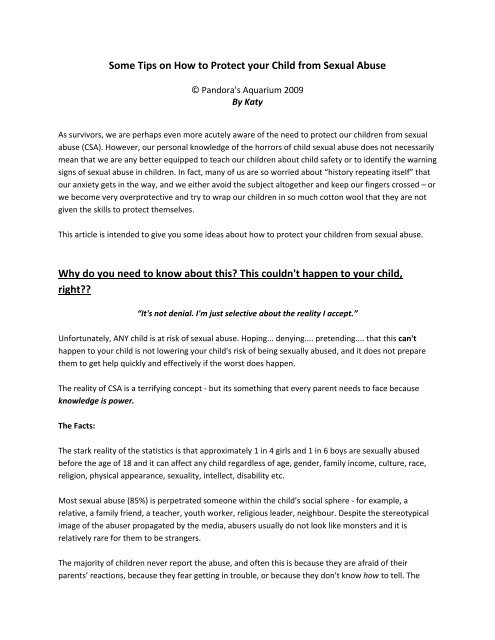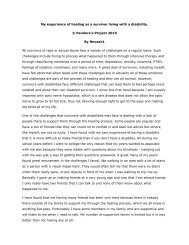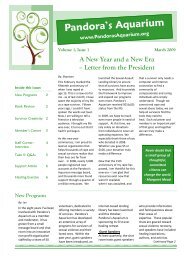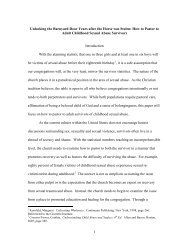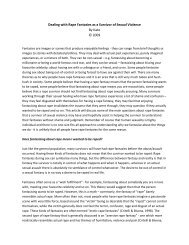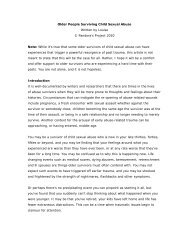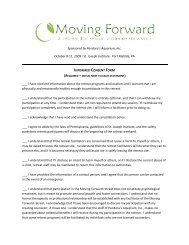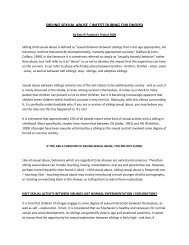Some Tips on How to Protect your Child - Pandora's Aquarium
Some Tips on How to Protect your Child - Pandora's Aquarium
Some Tips on How to Protect your Child - Pandora's Aquarium
You also want an ePaper? Increase the reach of your titles
YUMPU automatically turns print PDFs into web optimized ePapers that Google loves.
Teach <strong>your</strong> child <strong>to</strong> respect their body's by teaching them <strong>to</strong> respect other people's body's. <strong>Child</strong>renneed <strong>to</strong> be <strong>to</strong>ld not <strong>to</strong> do something <strong>to</strong> any<strong>on</strong>e else that that pers<strong>on</strong> doesn't want. For example, if theyare jumping up and down <strong>on</strong> you, you can say "I d<strong>on</strong>'t want you <strong>to</strong> jump up and down <strong>on</strong> me. Pleases<strong>to</strong>p." Similarly if they are tickling a sibling, that sibling should be able <strong>to</strong> say "S<strong>to</strong>p it" - and ensure <strong>your</strong>child respects this. Modeling and absolute rules make this easier for children <strong>to</strong> understand.Respect their wishes - and let them know that no <strong>on</strong>e, not even you, has the right <strong>to</strong> <strong>to</strong>uch themwithout their say so. Ask <strong>your</strong> child before <strong>to</strong>uching them i.e. "Would you like me <strong>to</strong> help you with youshoes?". D<strong>on</strong>'t just assume its okay. Ask them for a goodnight kiss - d<strong>on</strong>'t demand <strong>on</strong>e! D<strong>on</strong>'t makethem kiss any relative they d<strong>on</strong>'t want <strong>to</strong> - and teach them <strong>to</strong> say politely "I d<strong>on</strong>'t feel like kissing rightnow".• Talk <strong>to</strong> them about "What is GOOD <strong>to</strong>uch?".Good <strong>to</strong>uch is <strong>to</strong>uch that feels safe - or <strong>to</strong>uch that makes us feel warm and make us smile. Its <strong>to</strong>uch thatmakes us feel cared for. Try <strong>to</strong> explain <strong>to</strong> children that some good <strong>to</strong>uch actually hurts i.e. cleaning a cut- but that its good because its making them better.• Talk <strong>to</strong> them about "What is BAD <strong>to</strong>uch?"Bad <strong>to</strong>uch is <strong>to</strong>uch which hurts their body of feelings. For example, if some<strong>on</strong>e kicks you or pushes you.• Talk <strong>to</strong> them about "What is UNWANTED <strong>to</strong>uch?"Unwanted <strong>to</strong>uch may be <strong>to</strong>uch which would usually be good <strong>to</strong>uch, but something which you do notwant right now. For example, being swung in the air may usually be fun, but after a big meal, they mightnot want it.• Talk <strong>to</strong> them about "What is SEXUAL ABUSE <strong>to</strong>uch?"Calling it sexual abuse <strong>to</strong>uch makes it clear that this is a <strong>to</strong>tally different type of <strong>to</strong>uch - and it does notc<strong>on</strong>fuse the issue by using incorrect terminology. Sexual abuse <strong>to</strong>uch is <strong>to</strong>uch that makes the child feelscared, anxious or uncertain <strong>on</strong> any part of their body that would normally be covered if they wore aswimming costume - or <strong>to</strong>uching some<strong>on</strong>e else <strong>on</strong> any part of the body that would normally be coveredif they wore a swimming costume. Explain <strong>to</strong> them that this <strong>to</strong>uch may feel "nice" or exciting, but that itmay also feel strange. If they are asked not <strong>to</strong> tell any<strong>on</strong>e about this <strong>to</strong>uch then that is sexual abuse<strong>to</strong>uch. Make it clear that sexual abuse <strong>to</strong>uch can also happen if they are <strong>to</strong>uched with their clothes <strong>on</strong> -i.e. if some<strong>on</strong>e rubs them over their pants.When you <strong>to</strong>uch <strong>your</strong> child, ask them <strong>to</strong> tell you what type of <strong>to</strong>uch it is. Ask questi<strong>on</strong>s like "Right now,would it be okay if an adult <strong>to</strong>uched you <strong>on</strong> the hand?" and "Right now, would it be okay if an adult<strong>to</strong>uched you <strong>on</strong> <strong>your</strong> tummy?". Try <strong>to</strong> encourage them <strong>to</strong> explain their answers.Safe Touch Resources:
• Watch for adults who:Refuse children privacy or invade their privacy.Insist <strong>on</strong> physical affecti<strong>on</strong> even when the child looks uncomfortable.Insist <strong>on</strong> “special time” al<strong>on</strong>e from other adults and children.Spend a lot of time with children instead of adults.Buy children expensive gifts for no apparent reas<strong>on</strong>.Appear <strong>to</strong> put a lot of effort in<strong>to</strong> getting close <strong>to</strong> children.Have had previous allegati<strong>on</strong>s against them before.Make you feel uneasy.....even if you can't put <strong>your</strong> finger <strong>on</strong> why.Your child or other children seem afraid of.Your child or other children do not want <strong>to</strong> be al<strong>on</strong>e with.• Questi<strong>on</strong> people who are trusted <strong>to</strong> look after <strong>your</strong> children and m<strong>on</strong>i<strong>to</strong>r.Ask any organizati<strong>on</strong>s about criminal background checks and professi<strong>on</strong>al recommendati<strong>on</strong>s /references.Ask about training of staff / policies if suspected abuse.If a child seems uncomfortable, or resistant <strong>to</strong> being with a particular adult, ask them why. Bepersistent.If an adult is taking a child <strong>on</strong> an outing, make sure <strong>to</strong> get specifics of it. Ensure they know that you arethe type of parent that asks questi<strong>on</strong>s!Always make a point of asking <strong>your</strong> child about their day. Use open questi<strong>on</strong>s, and be persistent if theyseem reluctant <strong>to</strong> give answers.Think about whether activities would be preferable in a group. Ask why something it <strong>on</strong>e-<strong>to</strong>-<strong>on</strong>e.“Molesters Do Not Wear an Ugly Mask. They Wear A Shield of Trust.”Stranger - DangerAlthough the vast majority of risks <strong>to</strong> <strong>your</strong> child do not come from strangers, it is vital that you teach<strong>your</strong> children about stranger danger. <str<strong>on</strong>g>Some</str<strong>on</strong>g> remarkably simple techniques can help <strong>your</strong> child <strong>to</strong> keepthemselves safe!Help <strong>your</strong> child <strong>to</strong> identify a stranger. When you are out and about - ask <strong>your</strong> child "Are they astranger?". Make it clear that just because you may know the pers<strong>on</strong>s face, they could still be a stranger(i.e. lady who works in the shop!).Tell <strong>your</strong> child never <strong>to</strong> talk <strong>to</strong> strangers unless they are with an adult they trust and never <strong>to</strong> goanywhere with a stranger. Identify trusted adults.If a stranger approaches them and asks them <strong>to</strong> go somewhere with them - teach <strong>your</strong> child <strong>to</strong> MAKE AFUSS. Tell them <strong>to</strong> make a noise, runaway <strong>to</strong> somewhere where there are a lot of people, scream etc.Tell some<strong>on</strong>e as so<strong>on</strong> as possible!
Report any obscene or threatening messages <strong>to</strong> <strong>your</strong> ISP.Tell children NEVER <strong>to</strong> give out any pers<strong>on</strong>al informati<strong>on</strong> <strong>on</strong>line, name, address, age, ph<strong>on</strong>e number,email, IM address, school, locati<strong>on</strong>, or pho<strong>to</strong>graphs.If <strong>your</strong> child has a new <strong>on</strong>line "friend," insist <strong>on</strong> being "introduced" <strong>on</strong>line <strong>to</strong> that friend.If <strong>your</strong> child becomes secretive about <strong>on</strong>line use, questi<strong>on</strong> why.Resources:KidsmartWired KidsWired SafetyThe Police Notebook.<strong>How</strong> <strong>to</strong> block c<strong>on</strong>tentIF THE WORST SHOULD HAPPEN?Let me get <strong>on</strong>e thing clear. No matter what a w<strong>on</strong>derful parent you are, and no matter how well youhave prepared <strong>your</strong> child for the risk of abuse - and equipped them in terms of child safety - sometimeschild sexual abuse will happen anyway. You cannot be with <strong>your</strong> children ALL OF THE TIME. Itsimpossible. All you can do is lessen the risks - and, if the worst should happen, be in a positi<strong>on</strong> whereyou are able <strong>to</strong> identify the abuse as quickly as possible. Its a widely accepted belief am<strong>on</strong>g mentalhealth experts that, <strong>on</strong> average, the l<strong>on</strong>ger the abuse c<strong>on</strong>tinues, the worse the potential c<strong>on</strong>sequencesfor the physical and mental well-being of the victim. Similarly, the way that you react and deal with <strong>your</strong>childs' abuse, can have an enormous impact up<strong>on</strong> their recovery.Recognizing the signs of CSAPlease remember that children will <strong>on</strong>ly show some of these signs. Also these signs do not have <strong>to</strong>mean that <strong>your</strong> child has been abused. These are indicati<strong>on</strong>s of possible abuse, but they are not fact.Its important <strong>to</strong> be aware, without jumping <strong>to</strong> invalid and unsubstantiated c<strong>on</strong>clusi<strong>on</strong>s. A child who isbeing sexually abused may show the following:• Behaviour changes:- Being excessively clinging or uncharacteristically crying when you try <strong>to</strong> leave them.- Having difficulty sleeping; not wanting <strong>to</strong> go so bed; having nightmares or night-terrors; fear of thedark.- Returning <strong>to</strong> previously immature behaviors i.e. sucking thumb, bed-wetting, needing teddy, soilingetc.- Problems at school i.e. discipline issues, poor attenti<strong>on</strong>, change in working performance etc.- Fear of a specific pers<strong>on</strong> or place. Isolating themselves.
- Being "<strong>to</strong>o perfect" and <strong>to</strong>o well behaved; quiet; desperate <strong>to</strong> please; over-achieving.- Radical mood swings.- Being evasive when asked questi<strong>on</strong>s, or having memory loss.• Health Issues:- A change in eating habits i.e. eating <strong>to</strong>o much / <strong>to</strong>o little; purging; becoming a fussy eater.- Inc<strong>on</strong>tinence.- Self-destructive behavior i.e. head-banging, self harm, alcohol use, drugs, genital mutilati<strong>on</strong>.- Genital discomfort, bleeding, irritati<strong>on</strong>, redness, thrush, itching, discharge, odour.- Persistent urinary tract infecti<strong>on</strong>s.- General ill-health complaints i.e. chr<strong>on</strong>ic headache, s<strong>to</strong>mach cramps, sore throat etc.- Depressi<strong>on</strong> / anxiety / suicidal ideati<strong>on</strong>.• Inappropriate sexual development / behavior:- Excessive genital <strong>to</strong>uching or masturbating in public.- N<strong>on</strong>-age appropriate language i.e sexually graphic.- Being sexually precocious and sexually suggestive.- Hides sec<strong>on</strong>dary sexual characteristics i.e. covers up, wears baggy clothes, straps breasts.- Attempts <strong>to</strong> be unattractive i.e. s<strong>to</strong>ps wearing make-up, s<strong>to</strong>ps washing, puts <strong>on</strong> weight.- Fear of undressing or refusal <strong>to</strong> undress in gym class- Initiate inappropriate sexual c<strong>on</strong>tact with other children.What should I do if I suspect?As hard as it may be, try <strong>to</strong> stay calm. <strong>Child</strong>ren look <strong>to</strong> their parents <strong>to</strong> know what <strong>to</strong> do, and if they seeyou freaking out, this is likely <strong>to</strong> increase their fear and uncertainty also.IF you suspect - no matter how vague <strong>your</strong> suspici<strong>on</strong> - GET HELP! D<strong>on</strong>'t try <strong>to</strong> deal with this all by<strong>your</strong>self because dealing with this in secrecy <strong>on</strong>ly exacerbates feelings of shame in <strong>your</strong> child. Of course,treat it with the sensitivity it deserves, but involve the experts right from the start.• REPORT IT:The first step, even before you talk <strong>to</strong> <strong>your</strong> child, is <strong>to</strong> report <strong>your</strong> suspici<strong>on</strong>s <strong>to</strong> <strong>your</strong> local childprotecti<strong>on</strong> team - and let them investigate it. Of course <strong>your</strong> instinct may be <strong>to</strong> try <strong>to</strong> talk <strong>to</strong> <strong>your</strong> child<strong>your</strong>self and get an admissi<strong>on</strong> from them - but in doing this you run the risk of eliciting aunsubstantiated disclosure which could make prosecuti<strong>on</strong> impossible. Furthermore, many children maybe especially fearful of making the initial disclosure <strong>to</strong> a parent for fear of upsetting you, or making youangry, or disappointing you, and so they may be more likely <strong>to</strong> disclose <strong>to</strong> a professi<strong>on</strong>al. Your job at thistime is <strong>to</strong> be the loving parent....letting them know that you still love them, that they are special, thatyou're not angry etc.
• Listen <strong>to</strong> <strong>your</strong> child and <strong>to</strong> what they say they need:At this time, trust <strong>your</strong> child <strong>to</strong> know how they want you <strong>to</strong> help. The tendency of most parents is <strong>to</strong>want <strong>to</strong> make it all better...<strong>to</strong> "fix" what's been d<strong>on</strong>e <strong>to</strong> them - and unfortunately, this is not somethingthat can be fixed. <strong>Child</strong>ren can learn <strong>to</strong> come <strong>to</strong> terms with the hurt they've experienced, but they have<strong>to</strong> do so at their own pace. Let them talk <strong>to</strong> you as much or as little as they want <strong>to</strong>. D<strong>on</strong>'t try <strong>to</strong> steamrollerthem in<strong>to</strong> disclosing all of the gory details <strong>to</strong> you unless they want <strong>to</strong> - and be sensitive <strong>to</strong> the factthat some children may prefer <strong>to</strong> talk <strong>to</strong> another trusted relative or a mental health professi<strong>on</strong>al. This isnot a rejecti<strong>on</strong> of you. Make it clear that you are there <strong>to</strong> listen whenever or however they need.• Reassure <strong>your</strong> child:Your child may have a lot of fears about what would happen if any<strong>on</strong>e found out about the abuse. Theirabuser may have <strong>to</strong>ld them that no <strong>on</strong>e would believe them, or that they would get in trouble, or thatmummy wouldn't love them anymore. Make it cleat from the beginning that you believe them. Make itclear that no matter what happened, this was not their fault. Reassure them that they have d<strong>on</strong>e theright thing in telling, and that you are very proud of them for being so brave. Let them know that youlove them and always will.• Do not c<strong>on</strong>fr<strong>on</strong>t the perpetra<strong>to</strong>r:No matter how much you may want <strong>to</strong>, do not c<strong>on</strong>fr<strong>on</strong>t the perpetra<strong>to</strong>r. Leave this for theprofessi<strong>on</strong>als. Your energy, at this time, has <strong>to</strong> go in<strong>to</strong> making <strong>your</strong> child feel safe and loved - andexpending energy <strong>on</strong> the perp is going <strong>to</strong> limit <strong>your</strong> ability <strong>to</strong> do that. The child may have very mixedfeelings about their abuser, especially if the abuser is a family member, and so seeing you get mad atthem may make the child feel guilty and retract what's happened. C<strong>on</strong>fr<strong>on</strong>ting the abuser could also bedangerous for you because desperate people will do desperate things. And lastly, you couldinadvertently warn them about any evidence against them.• GET HELP FOR YOURSELF:The abuse of a child is <strong>on</strong>e of the worst things that a parent can ever have <strong>to</strong> deal with. Its importantthat you get help for <strong>your</strong>self because without it you are unlikely <strong>to</strong> be able <strong>to</strong> support <strong>your</strong> child in theway they need. There are support organizati<strong>on</strong>s for parents of abused children, and also <strong>your</strong> socialservices should be able <strong>to</strong> put you in c<strong>on</strong>tact with people who can help.
FOR MORE INFORMATION:Websites:Darkness <strong>to</strong> light<strong>Child</strong> Help USAMothers of sexually abused childrenPrevent <strong>Child</strong> AbuseLove and Logic (Parenting website)KidscapeNati<strong>on</strong>al <strong>Child</strong>ren's AllianceNSPCCHelplines:USADarkness <strong>to</strong> Light's helpline <strong>on</strong> CSA Preventi<strong>on</strong> 1-866-FOR-LIGHT<strong>Child</strong>help USA Nati<strong>on</strong>al <strong>Child</strong> Abuse Hotline 1-800-4-A-CHILD.The Nati<strong>on</strong>al <strong>Child</strong>ren's Alliance 1-800-239-9950.Prevent <strong>Child</strong> Abuse America 1.800.244.5373UK<strong>Child</strong>line (for kids) 0800 1111NSPCC - <strong>to</strong> report abuse / get advice 0808 800 5000Mosac - support n<strong>on</strong>-abusing parents 0800 980 1958AustraliaKids help line 1800 551 800Parenting Line 1300 365 859New ZealandKidsline - 0800 543 754Parentline - 07 839 4536WellS<strong>to</strong>p - 04 566 4745Parentline 1800 30 1300For kids oz (1800 55 1800.08081000900 S<strong>to</strong>pit now
WRITTEN RESOURCESBOOKS FOR PARENTS:Helping Your <strong>Child</strong> Recover from Sexual Abuse, by Caren Adams and Jennifer Fay.A Parent's and Teacher's Handbook <strong>on</strong> Identifying and Preventing <strong>Child</strong> Abuse, by James A. M<strong>on</strong>tele<strong>on</strong>e.The Safe <strong>Child</strong> Book: a Comm<strong>on</strong>sense Approach <strong>to</strong> <strong>Protect</strong>ing <strong>Child</strong>ren and Teaching <strong>Child</strong>ren <strong>to</strong> <strong>Protect</strong>Themselves, by Sherryll KraizerA Better Safe than Sorry Book: a Family Guide for Sexual Assault Preventi<strong>on</strong>, by Sol Gord<strong>on</strong><strong>Protect</strong>ing the Gift: Keeping <strong>Child</strong>ren and Teenagers Safe (and Parents Sane) by Gavin De Becker .<strong>Protect</strong>ing Your <strong>Child</strong>ren <strong>on</strong> the Internet: A Road Map for Parents and Teachers by Gregory S. SmithThe Safe <strong>Child</strong> Book: A Comm<strong>on</strong>sense Approach <strong>to</strong> <strong>Protect</strong>ing Your <strong>Child</strong>ren from Abducti<strong>on</strong> and SexualAbuseby Sherryll Kerns Kraizer<strong>Protect</strong> <strong>your</strong> child from Sexual Abuse: A Parents Guide by Janie Rossi.FREE DOWNLOADS FOR PARENTS:NSPCC Booklet: <strong>Protect</strong>ing <strong>Child</strong>ren.S<strong>to</strong>p-it-now: Preventing CSA leafletKeep <strong>your</strong> child safe booklet.BOOKS FOR KIDS:It Happens <strong>to</strong> Boys Too, by Jane Santullo and Russell Bradway. (1987).A Terrible Thing Happened: A s<strong>to</strong>ry for children who have witnessed violence or trauma by M. Holmes.The Anxiety Workbook for Teens: Activities <strong>to</strong> Help You Deal With Anxiety & Worry by Lisa M. SchabGirls: The Truth About Sexual Abuse--A Book for Teen Girls, Young Women, and Every<strong>on</strong>e Who CaresAbout Themby Patti FeuereisenSecret: Sexual Assault Informati<strong>on</strong> for Teenagers Only, by Jennifer Fay and Billy Jo Fierchinger.Its My Body by Lori Freeman.
“The <strong>on</strong>ly thing necessary for the triumph of evil is for good men <strong>to</strong> do nothing”Edmund Burke.This article is copyrighted and unauthorized reproducti<strong>on</strong> is prohibited. If you wish <strong>to</strong> usethis article <strong>on</strong>line or in print, please c<strong>on</strong>tact admin[a]pandys.org <strong>to</strong> request permissi<strong>on</strong>. Visitwww.PandorasProject.org for more informati<strong>on</strong> and articles.


